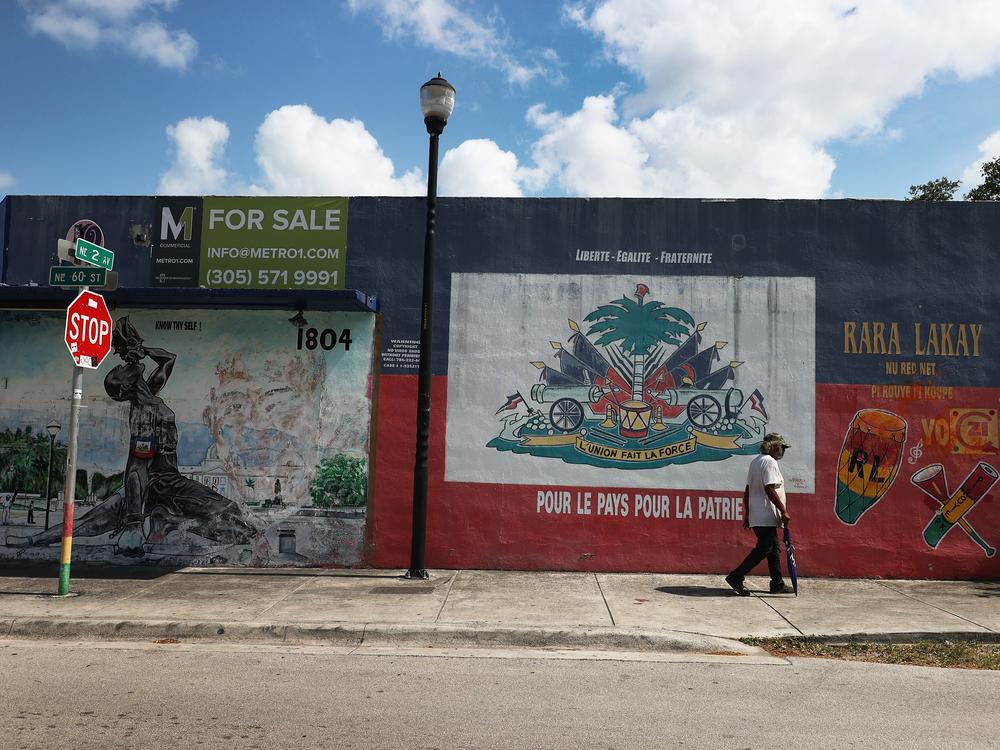Section Branding
Header Content
Miami’s Little Haiti neighborhood is on borrowed time. A film is documenting it all
Primary Content
MIAMI — For decades a neighborhood in Miami known as Little Haiti has been the center of the Haitian community. But what's made the area so unique now has the attention of developers.
A filmmaker wanted to document the changes and highlight the struggles of people living there — and it's all part of a film released this month.
The film Mountains tells the story of a family that’s experiencing the changes firsthand in Little Haiti. It’s shot with a Haitian American cast with dialogue in Haitian Creole and is being released nationwide this month.
Little Haiti is a neighborhood known for the colorful storefronts of convenience stores, restaurants and botanicas lining Miami’s Second Avenue. People sit on chairs outside the stores and their homes as the occasional rooster struts by. Haitians fleeing poverty and political repression began coming here in the 1970s and '80s. It wasn’t until 2016 though, that Miami officially designated the neighborhood “Little Haiti.”
It’s the setting for the first full-length feature by Haitian American filmmaker Monica Sorelle. At Choublak, a coffee shop and visitor’s center in Little Haiti, Sorelle told NPR in an interview, “We actually shot here. The scene where Esperanza’s on her walk and stops at the vendor. It was here.”
Sorelle spent a lot of time in Little Haiti when she was growing up. Developers have long been eyeing this area. But redevelopment moved into high gear over the last decade after they transformed an adjacent neighborhood, Wynwood, into a wealthier arts and nightlife district.
Sorelle saw it happening in Little Haiti when she returned to Miami after film school in 2014. “I started realizing and noticing the changes in the neighborhood,” she says. “And started seeing a lot of the same developers that were working in Wynwood were buying up properties in Little Haiti.”
Sorelle’s film opens with scenes of crews using heavy machinery to demolish buildings in the neighborhood. It’s the kind of thing she was seeing daily there and in Wynwood where she was working at the time.
One day, Sorelle noticed demolition workers ending their day and one crossing the street as he walked back home. She says, “The question came up, like what if he lives over there and he crosses the street to demolish his own neighborhood and redevelop his own neighborhood?”
That idea grew into the script for Mountains. A Miami nonprofit, Oolite Arts, provided important funding for a microbudget film with a Haitian American cast.
Shooting it in Haitian Creole made it difficult to find financial backers. Robert Colom, who co-wrote the script and produced the film, says, “A big production company that we met with in New York said, ‘We can make this together for $2 million and in English and with stars.’ It just wasn’t the idea that we had for this film. To be able to tell an authentic story about an experience of Little Haiti, I think we had to do it in the way that we did.”
The film’s title, Mountains, is taken from a Haitian proverb, “Behind mountains, there are more mountains.” It’s a nod to the challenges the story’s main character, Xavier, and all immigrants face as they adapt to a new country. Sorelle says, “That looks like, if I work hard, I will be able to provide. And I will be able to climb. And he has worked hard and he has been able to provide. And he has a house, you know. But the minute he wants more, that’s when he starts to realize that it’s not as accessible to him as he thought.” In the film, Xavier becomes frustrated with his inability to move his family into a bigger home.
An important part of the movie, and Haitian culture, is rara, an impromptu street parade with music that harks back to the revolution that brought Haiti its independence. Sorelle says raras used to happen almost every Friday. “You would be in your home. And then you would just hear the distant sound of a drum or a horn,” she says. “And all of a sudden, there’s like this beautiful, spontaneous street parade that a lot of Haitians would join in on.” Rara parades are less common in Little Haiti now, another sign of the changing neighborhood.
Little Haiti’s days may be numbered, but the Haitian American community has long since established a strong presence in several other neighborhoods and cities in South Florida. Sorelle is philosophical about the changes, saying: “These are just buildings after all. But I think what concerns me is that it’s a disrespect of what the Haitian community has given. And the minute it's economically viable, there’s no use for these people anymore.”
Sorelle’s film, Mountains, opened in Miami and is playing at independent theaters this month and next in Florida and other areas around the country.


